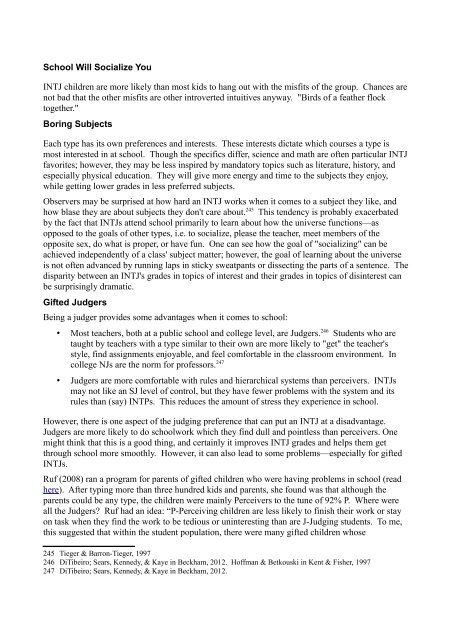You also want an ePaper? Increase the reach of your titles
YUMPU automatically turns print PDFs into web optimized ePapers that Google loves.
School Will Socialize You<br />
INTJ children are more likely than most kids to hang out with the misfits of the group. Chances are<br />
not bad that the other misfits are other introverted intuitives anyway. "Birds of a feather flock<br />
together."<br />
Boring Subjects<br />
Each type has its own preferences and interests. These interests dictate which courses a type is<br />
most interested in at school. Though the specifics differ, science and math are often particular INTJ<br />
favorites; however, they may be less inspired by mandatory topics such as literature, history, and<br />
especially physical education. They will give more energy and time to the subjects they enjoy,<br />
while getting lower grades in less preferred subjects.<br />
Observers may be surprised at how hard an INTJ works when it comes to a subject they like, and<br />
how blase they are about subjects they don't care about. 245 This tendency is probably exacerbated<br />
by the fact that INTJs attend school primarily to learn about how the universe functions—as<br />
opposed to the goals of other types, i.e. to socialize, please the teacher, meet members of the<br />
opposite sex, do what is proper, or have fun. One can see how the goal of "socializing" can be<br />
achieved independently of a class' subject matter; however, the goal of learning about the universe<br />
is not often advanced by running laps in sticky sweatpants or dissecting the parts of a sentence. The<br />
disparity between an INTJ's grades in topics of interest and their grades in topics of disinterest can<br />
be surprisingly dramatic.<br />
Gifted Judgers<br />
Being a judger provides some advantages when it comes to school:<br />
• Most teachers, both at a public school and college level, are Judgers. 246 Students who are<br />
taught by teachers with a type similar to their own are more likely to "get" the teacher's<br />
style, find assignments enjoyable, and feel comfortable in the classroom environment. In<br />
college NJs are the norm for professors. 247<br />
• Judgers are more comfortable with rules and hierarchical systems than perceivers. INTJs<br />
may not like an SJ level of control, but they have fewer problems with the system and its<br />
rules than (say) INTPs. This reduces the amount of stress they experience in school.<br />
However, there is one aspect of the judging preference that can put an INTJ at a disadvantage.<br />
Judgers are more likely to do schoolwork which they find dull and pointless than perceivers. One<br />
might think that this is a good thing, and certainly it improves INTJ grades and helps them get<br />
through school more smoothly. However, it can also lead to some problems—especially for gifted<br />
INTJs.<br />
Ruf (2008) ran a program for parents of gifted children who were having problems in school (read<br />
here). After typing more than three hundred kids and parents, she found was that although the<br />
parents could be any type, the children were mainly Perceivers to the tune of 92% P. Where were<br />
all the Judgers? Ruf had an idea: “P-Perceiving children are less likely to finish their work or stay<br />
on task when they find the work to be tedious or uninteresting than are J-Judging students. To me,<br />
this suggested that within the student population, there were many gifted children whose<br />
245 Tieger & Barron-Tieger, 1997<br />
246 DiTibeiro; Sears, Kennedy, & Kaye in Beckham, 2012. Hoffman & Betkouski in Kent & Fisher, 1997<br />
247 DiTibeiro; Sears, Kennedy, & Kaye in Beckham, 2012.




